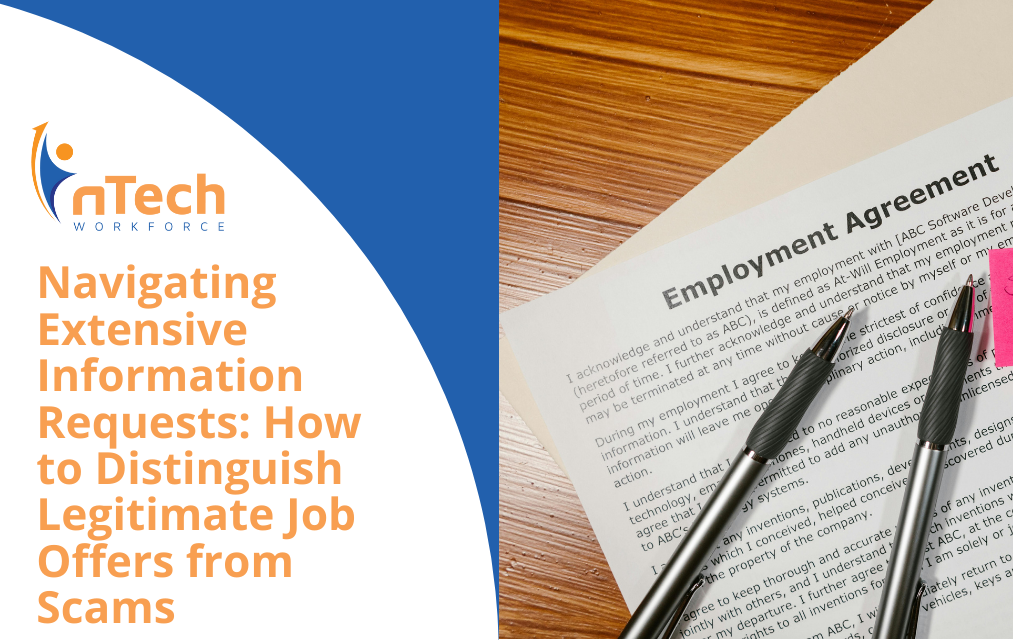How Can You Optimize Your Resume for Applicant Tracking Systems?
Let’s face it—job hunting can feel like a full-time job. You’ve perfected your resume, crafted the perfect cover letter, and hit "Apply." Then…...
-1.png?width=303&height=403&name=Job%20Seekers%20Mega%20Menu%20(1)-1.png)
Check out our nSider Hub for all of nTech's staffing-related resources.
3 min read
![]() nTech Workforce
:
Dec 17, 2024 9:00:00 AM
nTech Workforce
:
Dec 17, 2024 9:00:00 AM

Do you find yourself sending out resumes, crossing your fingers, and dreaming about that perfect role? The anticipation is real—but so is the frustration when a potential employer asks for far too much personal information upfront.
Job scams are more sophisticated than ever, often disguised as legitimate opportunities with professional logos, polished websites, and convincing emails. These scams prey on job seekers by requesting sensitive information, leaving you vulnerable.
Here’s the good news: staying informed can help you avoid these pitfalls. As staffing experts, we’re here to guide you in spotting red flags so you can focus on genuine opportunities and finding the role that’s truly the right fit.
Before diving into how to spot scams, let’s first clarify why legitimate companies ask for your details. During the hiring process, employers need specific information to verify your identity, check references, and assess your qualifications. For example, they might ask for:
These requests are completely normal and typically come after some level of interaction, like a phone screen with a recruiter or an interview.
But what happens if the request doesn’t feel quite right? Keep reading as we outline the steps to take if you suspect something’s off…
Not all requests for information are created equal. Here are some key warning signs that the “job opportunity” you’re considering might actually be a scam:
1. Unsolicited Offers: If you didn’t apply for the job but suddenly received an offer, proceed with caution. Scammers often send out mass emails to lure unsuspecting job seekers
2. Requests for Financial Information: Legitimate employers will never ask for sensitive financial details like your bank account number, credit card info, or Social Security number during the initial stages
3. Upfront Payments: If an employer asks you to pay for training, software, or background checks upfront, consider it a major red flag. Real companies typically cover these costs or deduct them after hiring
4. Overly Aggressive Deadlines: Scammers often try to rush you, creating a false sense of urgency. If you’re feeling pressured to act fast, take a moment to step back and reassess
5. Poor Communication: Watch out for generic greetings like “Dear Applicant,” or emails with poor grammar and typos. Legitimate companies take care in their communication and maintain a professional tone
Keep these tips in mind as you navigate new opportunities. If something feels off, trust your instincts—there’s usually a reason for that gut feeling.
Now that you’re aware of the warning signs, let’s dive into some practical steps to verify if a job offer is legitimate. Follow these tips:
Research the Company: A quick online search can reveal a lot. Check the company’s website, social media pages, and employee reviews (e.g., LinkedIn, Glassdoor, etc.). If their online presence feels thin or outdated, proceed with caution
Cross-Check Email Domains: Legitimate companies typically use official email domains (e.g., @company.com). If you receive an email from a generic domain, like @gmail.com or @yahoo.com, dig a little deeper
Verify the Recruiter’s Identity: If a recruiter reaches out to you, search for them on LinkedIn or the company’s website to confirm they’re real. A lack of an online presence or mismatched information should raise a red flag
Ask Questions: Don’t hesitate to ask for more details about the role, company, or hiring process. Scammers often struggle to provide concrete answers. Real employers appreciate candidates who do their due diligence.
In summary, trust your gut. If something feels off, it probably is. Listen to your instincts and always proceed with caution.
If you suspect a job offer is a scam, here’s how to protect yourself and others:
Let’s not forget—navigating the job market doesn’t have to be a solo mission. Staffing agencies like nTech are here to bridge the gap between you and finding your next great role. We do the heavy lifting, ensuring you only interact with verified employers who value your skills.
We know the job hunt can be daunting, but remember: staying informed and cautious can make all the difference. Keep these tips in mind, and you’ll protect yourself while setting yourself up for success.
Ready to explore genuine opportunities with a trusted partner? Let’s connect and make your job search safer, smarter, and more rewarding.
Let’s face it—job hunting can feel like a full-time job. You’ve perfected your resume, crafted the perfect cover letter, and hit "Apply." Then…...

With over 225 million members, LinkedIn is filled with potential employers, recruiters, and business professionals. Regardless of whether you’re...

In the quest for career advancement, the importance of professional networking cannot be overstated. The journey to landing one's dream job is often...